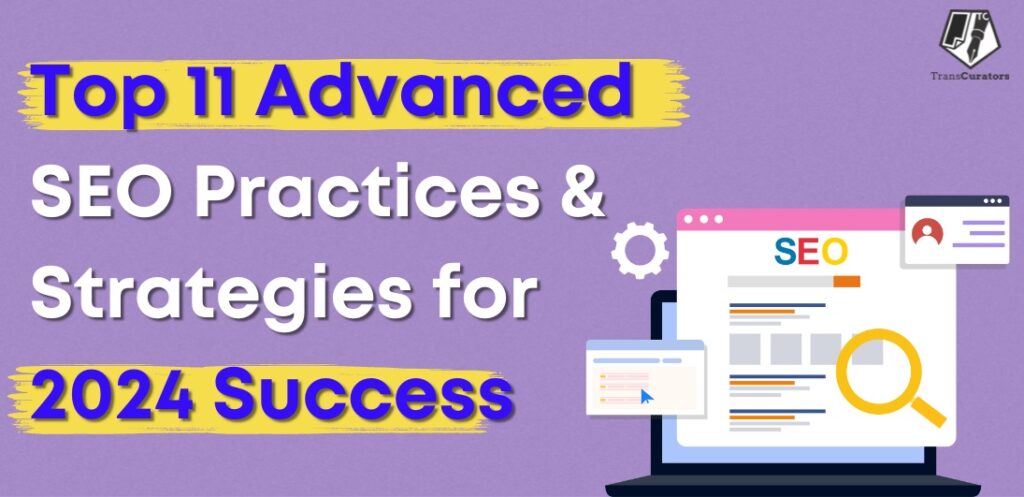Top 11 Advanced SEO Practices & Strategies for 2024 Success
In the ever-changing world of digital marketing, staying ahead of the competition with SEO can either make or break your online presence. As we enter 2024, the SEO world is more dynamic than ever. With constant algorithm updates and evolving user behaviour, advancing your SEO game requires more than basic optimization. It goes beyond just utilising the right keywords or providing compelling content. It’s now time to master the complexities of search engines and use modern techniques to rise above the competition. The landscape is rich in new opportunities, from optimising for voice search to harnessing the power of AI. Why Does SEO Matters? The Vital Role of SEO in Modern Business SEO serves as a bridge, connecting your website to potential customers actively searching for your products or services. By optimising your site for search engines, you increase its exposure and attract high-quality, relevant organic visitors. This boosts conversion rates while also increasing brand trust and credibility. In a nutshell, SEO is about more than just ranking higher in search results; it’s also about providing a smooth user experience, increasing customer engagement, and, ultimately, supporting your long-term business growth. 11 Advanced SEO Practices & Strategies to Master in 2024 Staying ahead in the digital marketing world means continuously evolving your SEO strategies. Here are the best seo techniques in 2024 to give your website a competitive edge: 1. Harnessing the Power of AI and Machine Learning Artificial intelligence and machine learning are revolutionising the way we approach SEO. Tools like Google’s RankBrain assist in understanding user intent, making it critical to provide content relevant to customers’ searches. Using AI, you can analyse massive volumes of data to find trends and patterns that can guide your SEO strategy. Machine learning algorithms can identify future trends, helping you remain ahead of the competition. Furthermore, AI-powered solutions can help with keyword research, optimization, and even automated content creation. Incorporating AI and machine learning into your SEO practices saves time while ensuring your efforts are data-driven and effective. Personalised User Experiences: AI can create customised content and user recommendations based on their past behaviour and preferences. Chatbots for Customer Engagement: Implement AI-driven chatbots to engage users in real-time, providing instant support and improving user satisfaction. Predictive Analytics: Use predictive analytics to forecast traffic patterns, customer behaviour, and the impact of SEO changes, allowing for proactive adjustments. Tools: MarketMuse: For AI-driven content research and optimization. BrightEdge: Provides AI-powered SEO and content performance insights. Clearscope: Uses AI to help with keyword research and content optimization. 2. Optimising for Voice Search The development of smart speakers and virtual assistants has increased the popularity of voice search. To optimise for voice search, focus on natural language and conversational keywords. When using voice search, users often ask questions in a conversational tone; thus, including long-tail keywords and question phrases in your content is important. Also, ensure your website is mobile-friendly, as most voice searches are on mobile devices. Creating content that directly responds to common questions will help you rank in voice search results. Voice search optimization enhances both SEO and user experience. Local SEO Synergy: Voice searches often have local intent; ensure your SEO is robust with updated NAP (Name, Address, Phone number) and localised content. Featured Snippets: Aim for featured snippets (position zero), as voice assistants often pull answers from these snippets. Tools: AnswerThePublic: Find natural language questions users are asking. Google’s Keyword Planner: Identify long-tail keywords. Schema Markup: Use FAQ schema to optimise for voice search. 3. Advanced Mobile SEO With mobile devices contributing to most searches, mobile website optimization is more crucial than ever. Ensure your site is responsive and offers a consistent experience across all devices. Users expect speedy results when using mobile devices, thus prioritising fast loading times. Use Accelerated Mobile Pages (AMP) to improve load speeds and user experience. Mobile-first indexing implies that Google ranks and crawls your site primarily based on its mobile version, so make sure your mobile site provides the same excellent content as your desktop version. Advanced mobile SEO allows you to reach a larger audience and increase customer satisfaction. Progressive Web Apps (PWAs): Implement PWAs to combine the best features of mobile sites and native apps, offering fast, reliable, and engaging user experiences. Touchscreen Usability: Ensure buttons and links are easily clickable on small screens, avoiding hover effects that don’t work on touchscreens. Tools: Google Mobile-Friendly Test: Check if your site is mobile-friendly. PageSpeed Insights: Assess and improve mobile load times. AMP Project: Tools and resources for implementing AMP. 4. Leverage Video Content Video content is a powerful tool to engage users and boost your SEO. Videos can captivate attention and convey information in a timely and effective way. To make use of video content, create high-quality videos that provide value to your audience. Optimise your videos for search using relevant keywords in titles, descriptions, and tags. Host your videos on YouTube, the second-largest search engine, to increase visibility. Embedding videos to your website can increase engagement and lower bounce rates. Video transcripts are another way to increase accessibility and add to the content that search engines index. Video content improves user experience, traffic, and rankings. Live Streaming: Engage with your audience in real-time through live streaming on platforms like YouTube and Facebook, which can increase interaction and retention. Video SEO: Optimise video sitemaps, provide captions, and create custom thumbnails to improve video discoverability and engagement. Tools: YouTube Studio: Optimise your videos for search. VidIQ: Provides SEO insights for video content. Wistia: This is for hosting and analysing video performance. Enhance User Experience 5. Enhance User Experience User experience (UX) is extremely significant in SEO. Google’s algorithms prioritise websites that offer a favourable user experience. To improve UX, focus on site performance, mobile optimization, and easy navigation. Ensure that your website is visually appealing and that vital content is easily accessible. To guide people around your site, utilise clear call-to-action buttons and an intuitive design. More importantly, reduce clutter and avoid intrusive pop-ups that might

